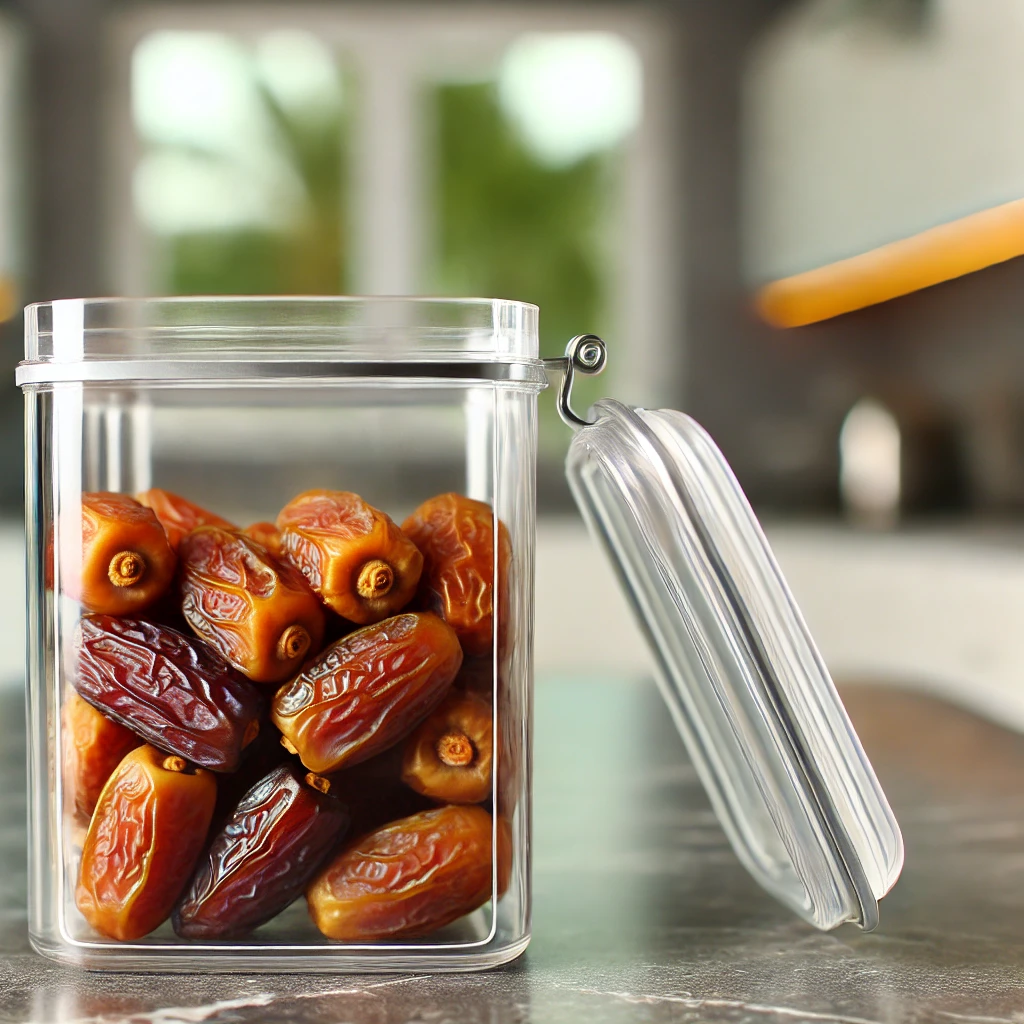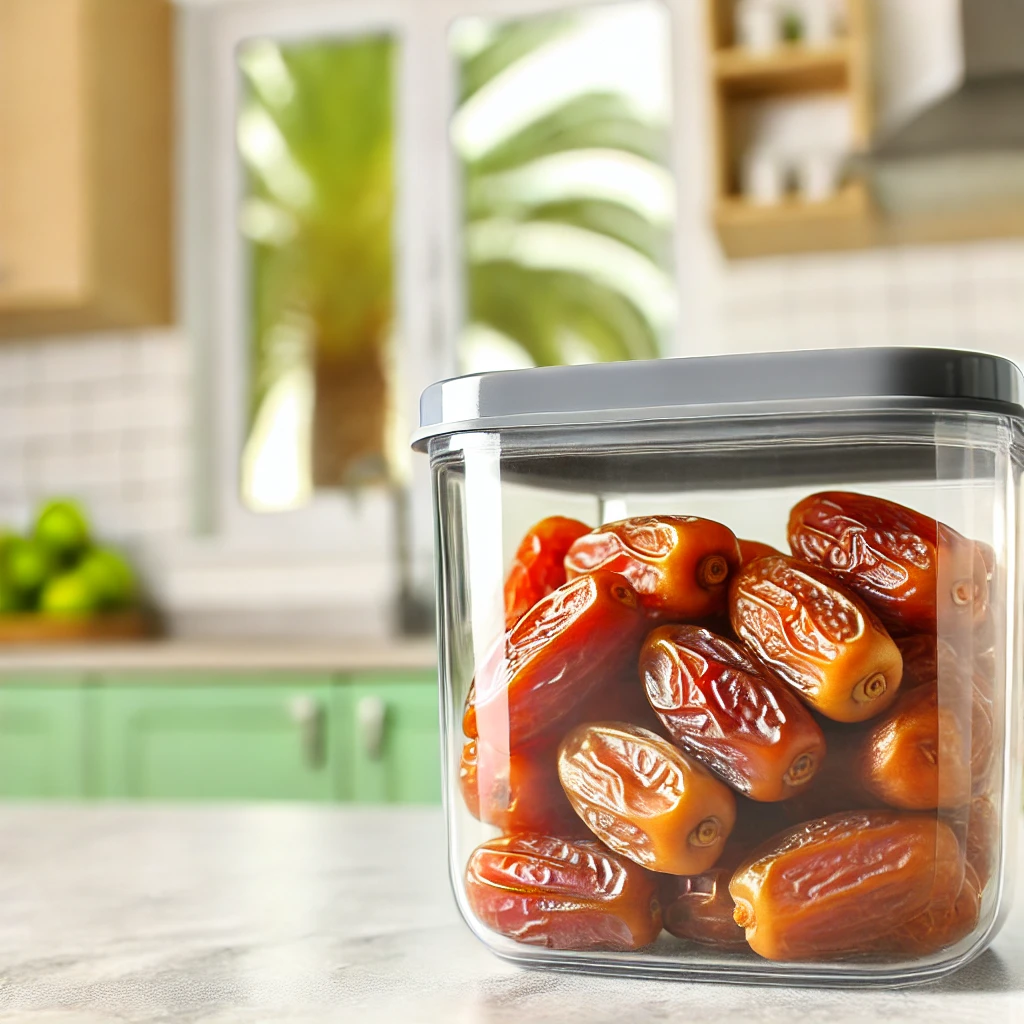Shopping Bag
No products in the cart.

Dates are not only a delicious and versatile fruit but also a powerhouse of nutrition. Often referred to as nature’s candy, they are packed with essential vitamins, minerals, and natural sugars that make them an ideal snack or ingredient for various dishes. However, like any food item, dates need to be stored correctly to retain their flavor, texture, and nutritional benefits. Improper storage can lead to dryness, loss of flavor, or, in worst cases, spoilage. Here’s a comprehensive guide on how to properly store dates for optimal freshness.
Before diving into storage techniques, it’s essential to understand the different varieties of dates. Some of the most popular types include:
Each type of date has a slightly different moisture content and texture, which can affect how you store them. Dates with higher moisture content, like Medjool, require more attention to maintain freshness compared to drier varieties like Deglet Noor.


For short-term storage (up to one month), room temperature is suitable for most types of dates. Dates, especially drier varieties like Deglet Noor, are naturally shelf-stable due to their low moisture content and high sugar concentration.
Use an Airtight Container: Whether you store dates in their original packaging or transfer them to a container, make sure it’s airtight. This prevents exposure to air, which can dry out the dates and cause them to lose their softness.
Keep Away from Heat and Direct Sunlight: Store dates in a cool, dark place like a pantry or cupboard. Heat and sunlight can speed up the degradation process, causing the dates to become hard or lose flavor.
Check for Pests: While dates are generally pest-resistant, it’s wise to check for any signs of infestation if storing them in an open environment.
"Olive Oil Field Finland"
“The team is part farmer, part archaeologist, always full of enthusiasm to inspire emotions through fragrances and flavors.”
If you live in a humid environment or plan to store dates for an extended period (up to six months), refrigeration is the best option. The cooler temperature helps preserve the dates’ moisture and freshness, especially for softer varieties like Medjool or Barhi.
Place in an Airtight Bag or Container: Ensure the dates are sealed tightly to prevent them from absorbing any odors or flavors from other foods in the fridge.
Label with Date: If you’re storing a large batch, label the container with the date of storage. While dates can last for several months, it’s helpful to keep track of how long they’ve been stored.
Avoid Overcrowding: If you’re storing dates in large quantities, avoid packing them too tightly in the container. Allowing some airflow helps to maintain their quality.
Check Moisture Levels: Some refrigerators can dry out food, so periodically check the dates for signs of drying. If they start to harden, consider moving them to the freezer.
For long-term storage (up to a year or more), freezing is the best way to preserve dates without compromising their texture or flavor. Dates freeze exceptionally well due to their high sugar content, which prevents them from becoming rock-hard in the freezer.
Pre-Freeze on a Tray: If you’re freezing large, soft dates like Medjool, it’s a good idea to pre-freeze them on a baking tray for a few hours. This prevents them from sticking together when you transfer them to a bag or container.
Use Freezer-Safe Bags or Containers: Once the dates are pre-frozen, transfer them to a freezer-safe bag or container. Make sure to squeeze out as much air as possible to avoid freezer burn.
Divide into Portions: If you plan to use dates in small quantities, consider dividing them into portion-sized bags. This way, you only need to thaw what you’re going to use.
Thawing Dates: To thaw, transfer the desired amount of dates to the refrigerator for a few hours or overnight. For immediate use, dates can also be thawed at room temperature.
Use within a Year: While dates can technically last longer than a year in the freezer, their quality begins to degrade over time. It’s best to use them within a year for optimal taste and texture.
While dates are relatively long-lasting, they can spoil under certain conditions, especially if exposed to moisture, heat, or contamination. Here are some signs that your dates may no longer be good to eat:
Foul Odor: Fresh dates have a mild, sweet smell. If they develop a sour or off-putting odor, they may have gone bad.
Mold Growth: Dates can develop mold if stored in a humid environment or if they come into contact with moisture. If you see white or greenish spots, discard the dates.
Excessive Hardness: While some dates are naturally firm, if your dates have become rock-hard, they may have dried out beyond use. While they’re not necessarily spoiled, the texture will be unpleasant.
Unusual Taste: Spoiled dates may taste sour or fermented. If you notice a strange taste, it’s best to discard them.
One of the most critical factors in date storage is the packaging. Whether at room temperature, in the refrigerator, or in the freezer, airtight containers or bags are essential. Exposure to air is the primary cause of dates drying out or becoming stale.
Investing in good-quality food storage bags or containers can make a significant difference in how long your dates last. Glass containers with airtight seals are an excellent option for both refrigeration and room temperature storage. If using plastic bags, opt for thicker, freezer-safe varieties to prevent damage during freezing.
Dates are a delightful, nutrient-rich fruit that can last a long time when stored properly. Whether you prefer the rich, caramel flavor of Medjool dates or the subtle sweetness of Deglet Noor, following the proper storage guidelines will ensure you get the most out of your dates. By using airtight containers, keeping them cool and dry, and opting for refrigeration or freezing when needed, you can extend the shelf life of your dates while preserving their flavor, texture, and nutritional value.
The date palm tree (Phoenix dactylifera) has a unique and highly efficient root system that supports
Introduction to Desert Sun Dates, a family-owned farm, and their dedication to excellence in date pr
If you're in or near the Coachella Valley, you have the opportunity to visit some of the best date f

